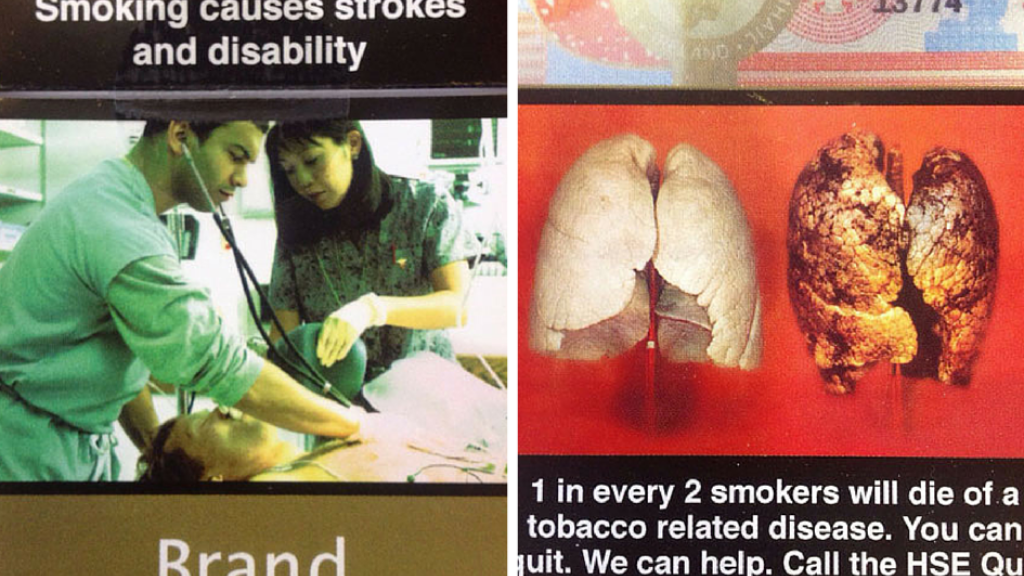
Irish Cancer Society calls on Minister to move on plain packaging
On Ash Wednesday, the country’s national no smoking day, the Irish Cancer Society is calling for plain cigarette packs to replace branded packs as soon as possible. This follows the Health (Miscellaneous Provisions) Bill’s recent passage through the Oireachtas and signature into law by the President.
The Society is now calling on the Minister for Health to start the clock on the ‘washout period’, the twelve months before retailers have to stock plain packs, without undue delay.
Donal Buggy, Head of Services and Advocacy at the Irish Cancer Society said: “We welcome the passing of the Health (Miscellaneous Provisions) Bill, which is not before its time. Delays have meant that we missed the deadline for commencement of plain packaging last May, and have fallen behind our European partners in France and the UK.”
Thanks in part to a co-ordinated campaign headed by the Irish Cancer Society the necessary legislation has passed. Now, according to Mr. Buggy, “it is time for the Minister to set out a start date on plain packaging, so we don’t fall even further behind.”
A survey undertaken by the cancer charity in May showed that 78% of people support the introduction of the standardised packaging of tobacco products.
Mr. Buggy said: “There is a clear and overwhelming appetite for plain packaging among the general public, who recognise its benefits. Almost 4 in 5 people are behind it, while more than 3 in 5 smokers support it. This will reduce smoking rates in Ireland, and will stop young people smoking before they start.”
When shown proposed plain packs of cigarettes, who’s only distinguishing feature, aside from graphic health warnings that cover 65% of the packs, is the name of the cigarette brand, the response of both smokers and non-smokers was positive.
“Our survey showed an overwhelmingly strong response from non-smokers to the packs, with many commenting on the strong impact of graphic warnings and their usefulness in highlighting health risks. Smokers alike reacted positively to the new packs’ educational value and many felt they would act as a deterrent to new smokers.”
Evidence from Australia shows that in the two years following the introduction of plain packaging, smoking rates fell to an historic low of 12.8%. This is down from 15.1% two years before its introduction. In Ireland, the smoking rate currently stands at 23%.
Mr. Buggy said: “We know from the experience of plain packaging in Australia that it is a very effective measure in tobacco control that will reduce smoking rates, plain and simple. It is especially useful in stopping young people from smoking. In Australia the daily smoking rate among 12-17 year olds has fallen to just 5%, compared to 8% here.”
3 in 5 smokers suggested that plain packaging will increase the effectiveness of health warnings and make smoking less attractive, with 7 in 10 non-smokers agreeing. However, smokers were slightly more sceptical about the impact of plain packaging on existing smokers.
Mr. Buggy said: “What our research shows is that smokers are less inclined to see plain packaging as an effective incentive for them to quit smoking. 38% of smokers thought it would encourage them to quit smoking, with 44% disagreeing, while 35% of smokers thought it would encourage family or friends to quit.”
“We expect that this view will evolve as plain packaging becomes the norm, but it highlights the need for continued investment in effective smoking cessation services to accompany such progressive public health actions”.
On Ash Wednesday, the Society wants to highlight actions that policymakers can take to support smokers to quit for good.
Mr. Buggy noted that plain packaging alone would not achieve the stated Government target of a Tobacco Free Ireland by 2025. “Plain packaging, while hugely important in encouraging people to quit and stopping young people before they start, needs to be accompanied by readily available supports for smokers to quit. We know that when existing smokers want to quit, they require individualised support.”
The 2016 Healthy Ireland survey shows that almost half of all smokers in Ireland have tried to quit in the past year without success.
“Making nicotine replacement therapy (NRT) available free of charge to all those enrolled in smoking cessation programmes, would help ensure smokers who want to quit get the support they need”.
All forms of NRT make it more likely that a person’s attempt to quit smoking would succeed. The chances of stopping smoking were increased by 50 to 70%.
